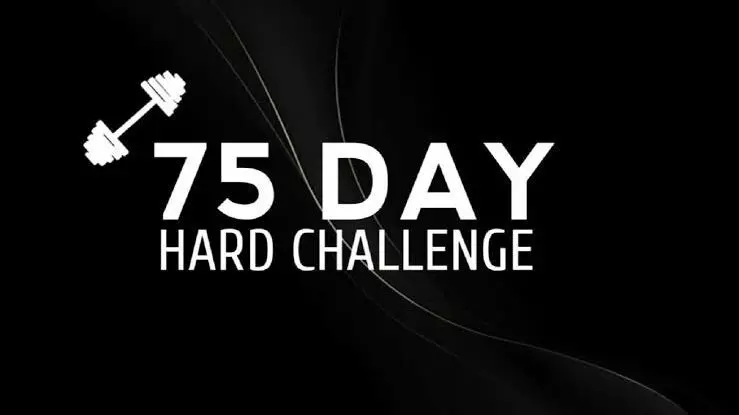What is 75 Hard Challenge that is breaking internet?
The 75 Hard Challenge is breaking the internet and social media has gone crazy about the challenge touted as a rigid self-improvement program
By - Anoushka Caroline Williams |
75 Hard Challenge is breaking the internet as social media goes crazy about the challenge touted as a rigid self-improvement program
Hyderabad: For a change, the 75 Hard Challenge is breaking the internet. Social media has gone crazy about the challenge touted as a rigid self-improvement program.
Andy Frisella, the programme creator, called it a `mental toughness challenge’ instead of a fitness plan.
Participants follow six rules for 75 days straight:
• Two 45-minute workouts a day
• One workout outdoors
• A strict diet with no cheat meals
• No alcohol
• Daily progress photo
• 10 pages of non-fiction reading
• 1 gallon of water
There are no rest days and no allowances for “life happening.” Break a rule and the participant restarts from Day 1.
Mental health experts say this structure taps into psychological forces that can drive meaningful behavioral change… or trigger burnout.
Commitment Device: A Contract With Yourself
The strict all-or-nothing design removes negotiation and excuses. Decisions are replaced by automatic compliance.
“People often fail goals not due to lack of desire, but because every day becomes a debate,” said Dr. Asha Raman, behavioral psychologist, told NewsMeter. “The 75 Hard format eliminates decision fatigue. A clear rule means one less negotiation between your long-term goals and your short-term impulses.”
This rigidity functions as a commitment device, forcing consistency through external rules rather than fluctuating motivation.
Identity Shift: Acting Before Believing
The daily actions involved in the challenge build a new identity through repetition. Psychologists call this the self-perception theory: behavior informs belief.
“When you act like someone disciplined for 75 days, your brain starts accepting that identity as reality,” explained clinical therapist Rohan Deshpande. “You’re not just doing fitness tasks. You’re rehearsing a version of yourself that keeps promises.”
This shift in self-concept can outlast the 75 days if habits are internalized.
Delayed Rewards and Habit Strengthening
With no immediate rewards built in, the challenge trains delayed gratification. Each micro-task contributes to long-term achievement, which strengthens neural pathways for discipline.
“Progress photos track physical changes, but the bigger transformation is neurological,” said Dr. Manasi Kulkarni, neuroscientist. “Repeated routines create habit loops. The brain becomes more efficient at choosing the difficult action.”
Over time, effort feels less like a struggle and more like a system.
Public Accountability: Social Pressure as Motivation
Many participants share daily updates online. This creates external accountability, a powerful motivator.
“Social visibility strengthens follow-through because quitting becomes a public act,” noted sports psychologist Arvind Sen. “The fear of embarrassment creates a push that willpower alone often cannot.”
However, he adds that individuals must differentiate personal growth from performance for an audience.
The Stress Factor: When Tough Turns Toxic
Experts warn that absolute rules can overwhelm those recovering from disordered eating, burnout, or mental health struggles.
“Extreme rigidity can become a punishment disguised as self-improvement,” cautioned Dr. Deshpande. “Missed days should not translate into shame or self-hatred. Sustainable change allows for flexibility.”
Research shows that rest, social connection, and emotional balance are crucial to long-term wellbeing. The challenge lacks these components.
Why Some Thrive and Others Struggle
Success in 75 Hard depends on personal context. People with stable routines and supportive environments may thrive, while others juggle unpredictable life demands.
“Programs that assume identical lifestyles ignore structural realities,” said Dr. Raman. “Discipline grows best alongside compassion, not against it.”
The challenge rewards consistency, not adaptability. For some, that feels empowering. For others, it feels like failure disguised as motivation.
A Tool, Not a Personality
The takeaway from psychologists: treat 75 Hard as a tool, not a definition of your worth.
It can:
• Build self-discipline
• Improve emotional resilience
• Highlight unhealthy coping habits
• Reset lifestyle patterns
It can also:
• Cause physical overtraining
• Trigger anxiety around food/exercise
• Create fear-based self-talk
“The real objective is not perfection. It is learning how you respond to pressure,” said Dr. Raman.